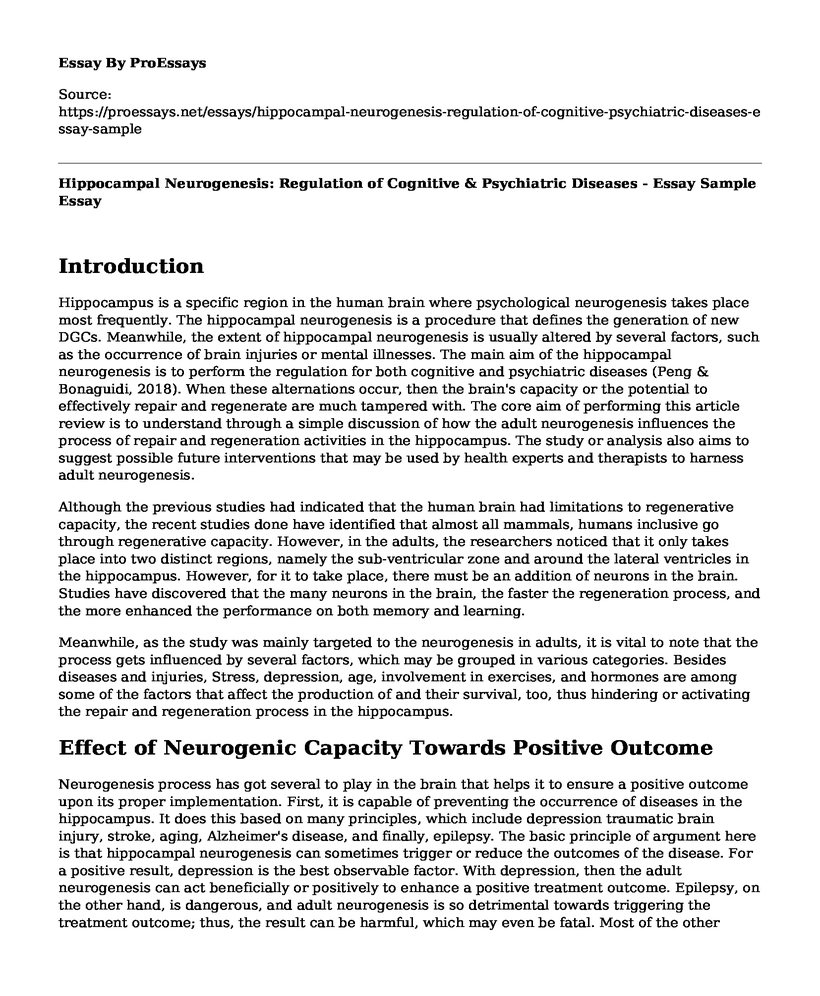Introduction
Hippocampus is a specific region in the human brain where psychological neurogenesis takes place most frequently. The hippocampal neurogenesis is a procedure that defines the generation of new DGCs. Meanwhile, the extent of hippocampal neurogenesis is usually altered by several factors, such as the occurrence of brain injuries or mental illnesses. The main aim of the hippocampal neurogenesis is to perform the regulation for both cognitive and psychiatric diseases (Peng & Bonaguidi, 2018). When these alternations occur, then the brain's capacity or the potential to effectively repair and regenerate are much tampered with. The core aim of performing this article review is to understand through a simple discussion of how the adult neurogenesis influences the process of repair and regeneration activities in the hippocampus. The study or analysis also aims to suggest possible future interventions that may be used by health experts and therapists to harness adult neurogenesis.
Although the previous studies had indicated that the human brain had limitations to regenerative capacity, the recent studies done have identified that almost all mammals, humans inclusive go through regenerative capacity. However, in the adults, the researchers noticed that it only takes place into two distinct regions, namely the sub-ventricular zone and around the lateral ventricles in the hippocampus. However, for it to take place, there must be an addition of neurons in the brain. Studies have discovered that the many neurons in the brain, the faster the regeneration process, and the more enhanced the performance on both memory and learning.
Meanwhile, as the study was mainly targeted to the neurogenesis in adults, it is vital to note that the process gets influenced by several factors, which may be grouped in various categories. Besides diseases and injuries, Stress, depression, age, involvement in exercises, and hormones are among some of the factors that affect the production of and their survival, too, thus hindering or activating the repair and regeneration process in the hippocampus.
Effect of Neurogenic Capacity Towards Positive Outcome
Neurogenesis process has got several to play in the brain that helps it to ensure a positive outcome upon its proper implementation. First, it is capable of preventing the occurrence of diseases in the hippocampus. It does this based on many principles, which include depression traumatic brain injury, stroke, aging, Alzheimer's disease, and finally, epilepsy. The basic principle of argument here is that hippocampal neurogenesis can sometimes trigger or reduce the outcomes of the disease. For a positive result, depression is the best observable factor. With depression, then the adult neurogenesis can act beneficially or positively to enhance a positive treatment outcome. Epilepsy, on the other hand, is dangerous, and adult neurogenesis is so detrimental towards triggering the treatment outcome; thus, the result can be harmful, which may even be fatal. Most of the other factors named are average, as they halfway enhance the positive outcome and negative outcome simultaneously.
Unclear Roles of Neurogenesis
Hippocampal neurogenesis in adults can be defined as the process whereby a backup for restoration after the number of neurons decline steadily due to conditions of disorder and other factor stated above. Typically the neurodegenerative diseases work based on injecting the brain with cytotoxic proteins, which kills the neurons present, thus leading to deficits in the functionalities of cognitive and behavioral activities. However, as many researchers do study in line with the neurogenesis, many doubts have resulted in if the hippocampus has got neurons. One researcher stated in his report that most of the neurons are located in the striatum and substantial other than the brain as earlier indicated.
But as long as the concept is still in doubt, it has been proved beyond doubt that there is a close relationship between neuron-degeneration and adult neurogenesis. This is because; the presence of the cytotoxic proteins in the brain, together with accumulation and deterioration of the levels of neurons, may both influence the rate of regenerating new neurons. Adult neurogenesis can also be altered frequently in the presence of degenerative pathologies; scientists are yet to discover if adult neurogenesis directly impacts the regeneration process of new neurons.
Overall Perspectives
To prevent the neural network or injuries which many short lines the cognitive and behavioral activities in the brain, endogenous neurogenesis can be done as it enhances the adaptability for the individual's environmental alternations. For other factors that may also cause danger such as stroke, depressions, the knowledge obtained from this review on the hippocampal neurogenesis implies that they can be prevented by doing comprehensive feasibilities towards the ongoing process of recovery for these illnesses.
However, the interventions mentioned earlier are only applicable and appropriate for long term diagnosis and treatment. When the recovery process is aimed to serve only a given for time duration (short-term), it is essential to understand that there are some other tremendous impacts after which may come in. One of the examples of such challenges includes the growth of immune to disease evidence of neuron degeneration often observed in TB1 (Peng & Bonaguidi, 2018).
Reference
Peng, L., & Bonaguidi, M. A. (2018). Function and dysfunction of adult hippocampal neurogenesis in regeneration and disease. The American journal of pathology, 188(1), 23-28.
Cite this page
Hippocampal Neurogenesis: Regulation of Cognitive & Psychiatric Diseases - Essay Sample. (2023, Mar 13). Retrieved from https://proessays.net/essays/hippocampal-neurogenesis-regulation-of-cognitive-psychiatric-diseases-essay-sample
If you are the original author of this essay and no longer wish to have it published on the ProEssays website, please click below to request its removal:
- Choice Behavior Guided by Learned, But Not Innate, Taste Aversion Recruits the Orbitofrontal Cortex - Article Analysis
- Consumer Health Issues Essay
- Paper Example on Young Adults in Stress: The Impact of the Stressor
- Psychotherapy: A Powerful Tool for Mental Health Management - Research Paper
- Essay on Ethiopia Confronts Challenge of Covid-19: Weak Healthcare System and Geography Prone to Spread
- Essay Example on Supervising Patient Access: Ensuring Care, Safety, & Accuracy
- Essay Example on Nurse Educators: Who are They & What Do They Do?







